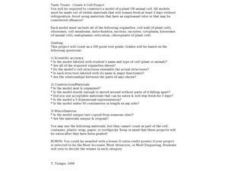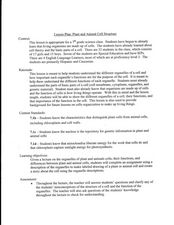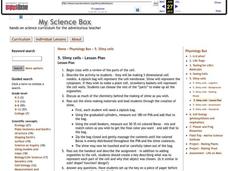Curated OER
Control of the Cell Cycle
In this cell cycle worksheet, students review how enzymes control the cell cycle and what happens when the cell cycle becomes uncontrolled. This worksheet has 7 short answer questions.
Curated OER
Algae Part One: An Introduction
Students have the opportunity to view two types of algae under 400x magnification with a compound microscope. They make observations and record their observations through drawings and words. In addition, they identify different qualities...
Curated OER
Digit Cells
For this algebra worksheet, students rewrite a word problem using algebraic symbols to find the digit in the first cell and tell how many zeros are in the entire digit number. There is an answer key.
Curated OER
Tasty Treats
In this biology worksheet, students construct a model of a plant or animal cell using edible materials that will remain fresh at least three days. They identify and label each part to include various organelles as listed. Students also...
Curated OER
Seeing Cells
Sixth graders study living cells and their functioning units. In this cell lesson students color cell diagrams, answer questions and discuss the differences between plant and animal cells.
Curated OER
Plant Cell Coloring
Learners study a plant cell and its parts. In this cell organelle lesson students are to label parts of a plant cell and color them.
Curated OER
Drawing a Plant Cell
In this cell structures worksheet, students draw a plant cell. Students draw and label all of the parts listed in the word bank. Students then identify each part by coloring it the color indicated in the word box.
Curated OER
Drawing an Animal Cell
In this animal cell structure worksheet, students draw an animal cell. Students then draw and label all of the cell parts listed in the word box. Students identify each part by coloring it the color in indicated in the box.
Baylor College
Observing Different Microbes
Following directions from a colorful slide preparation card, beginning biologists examine three different live microorganisms: bacteria, yeast, and paramecia. This is not an unusual activity to do with your class, but if you are doing it...
Curated OER
Using Homophones Part 4
In this spelling homophones correctly worksheet, 4th graders use the homophone pairs in the words box to complete each pair of sentences.
Curated OER
Hereditary Defects: Down Syndrome and Sickle Cell Anemia
Students solve problems like the following examples: 1. If you have 10,000 women, age 30, who have babies and one in 900 of these births will result in a Down syndrome baby, how many will have this disease? 2. 5,000 babies are born;...
Curated OER
Plant And Animal Cells
Students identify parts of plant and animal cells and describe the functions of each part. They distinguish between plant and animal cells. After a lecture/demo, students perform experiments which help them construct models of plant and...
Curated OER
Cell Structure and DNA
Sixth graders identify, locate and describe the function of the parts of a cell. In groups, they state the five stages of mitosis and put them in the correct order. They are introduced to the structure of DNA and mRNA and how they...
Curated OER
Plant and Animal Cell Structure
Seventh graders identify the different parts and functions of the cell. For this biology lesson, 7th graders make a labelled diagram of either a plant or animal cell. They write a story about it.
Curated OER
Slimy cells
Students study the parts of a cell. In this chemistry lesson students complete an activity in which they make as much slime as they want.
Curated OER
Cell Works
Students identify the different parts of the cells and their functions. In this biology instructional activity, students create an analogy of a cell and its organelles. They make a poster and present it to class.
Curated OER
Spotlight on Photovoltaics and Fuel Cells
Learners utilize Internet resources to uncover the pros and cons of two topics in alternative energy technology: photovoltaics and fuel cells. Students analyze the structure and function of each system to make observations about the...
Curated OER
The Human Cheek Cell
Students list the parts of cell theory and describe and define vocabulary. In this cell lesson students complete a handout that includes sketching a cell.
Curated OER
The Giant Cell
After actively participating in a unit on cells, the middle schoolers act out and become the organelles. They will act out and explain the functions of what each of the organelles do for the cell.
Curated OER
The Cell Theory
In this cells worksheet, students review how the cell theory was developed. Students review the structure and function of cell structures and active transport. This worksheet has 30 fill in the blank questions.
Curated OER
Cell Community
Seventh graders use technology to review cell structure and function. In this cells less, 7th graders review the parts and functions of a cell, and use photography/video and PowerPoint to enhance their explorations.
Curated OER
Creating a Plant Cell Journal
Fifth graders gather information about plant cells. As they read in their science book about plant cells, they take notes on the important facts. Then, they look at their notes and organize them into an outline before they write their...
Curated OER
Study of the Cell
Students draw a diagram to show the fluid mosaic model of a membrane. They explain how hydrophobic and hydrophilic properties help membranes hold their shape. They identify the functions of different cell membrane proteins as well.
Curated OER
The Journey of a Red Blood Cell
Fifth graders examine how a red blood cell travels throughout the body. Using a model, they follow the flow of blood throughout the entire body. They identify the functions of the lungs and discuss the difference of the blood entering...
Other popular searches
- Animal Cell Parts
- Parts of Cells
- Eukaryotic Cells Parts
- Animal Cell Parts Pictures
- Animal Cell Parts Draw
- Label Animal Cell Parts
- Eukaryote Cells Parts
- Parts of an Animal Cell
- Cells Parts and Functions
- Parts of Plant Cells
- Plants Cells and Parts

























